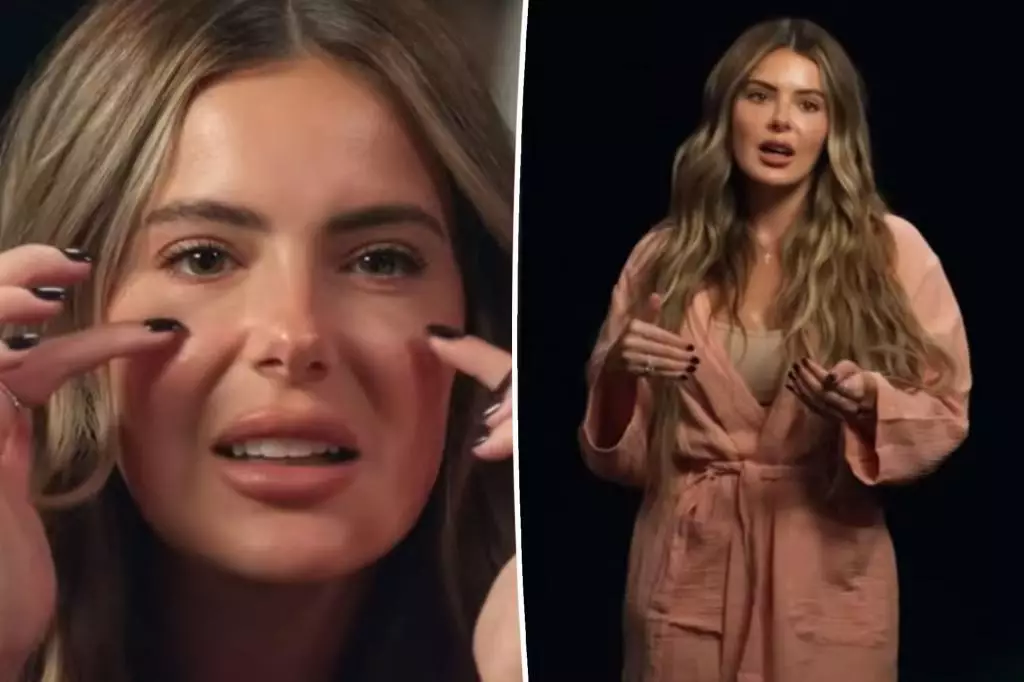In the flashing glare of social media and Hollywood’s relentless beauty standards, many young adults find themselves caught in a cycle of self-scrutiny and, often, premature cosmetic interventions. Brielle Biermann’s candid reflection on her youthful pursuit of fillers underscores a broader societal issue: the normalization of cosmetic procedures at an age when self-identity is still evolving. Her story reveals how familial influence, especially from a parent immersed in appearance-focused routines, can shape perceptions of beauty. Biermann’s admission that her mother, Kim Zolciak, facilitated her early start in cosmetic procedures isn’t just about personal choice—it’s a reflection of cultural conditioning where youthful insecurity is masked by medical interventions, often reinforced by societal praise.
Her experience signals a troubling trend: when cosmetic enhancements are presented as normative, they inevitably influence impressionable minds. Biermann’s narrative isn’t unique; it echoes a collective narrative of young celebrities and social media personalities who, under public scrutiny, begin altering their appearances before fully understanding the implications. This early exposure to aesthetic procedures can distort self-esteem, creating a skewed perception of beauty that’s more about fitting societal ideals than embracing authentic selfhood.
The Dangers of Premature Cosmetic Interventions
Biermann’s regret over filler, especially under her eyes, highlights the risks of rushing into cosmetic procedures without a thorough understanding of their long-term effects. Her uneven under-eyes can serve as a cautionary tale, illustrating how even minor procedures can lead to unintended consequences. The puffiness and asymmetry she now grapples with demonstrate that fillers are not as benign as many believe, especially when administered at a young age.
It’s important to question why cosmetic standards are often rooted in superficial perfection rather than genuine well-being. The normalization of procedures, driven by social media trends, creates a hazardous environment for young individuals—like Biermann—who may view these interventions as quick fixes for deeper insecurities. Yet, when reality hits and the effects aren’t as seamless as expected, the emotional toll can be considerable. For some, like Biermann, it becomes a journey of regret and reevaluation, exposing the psychological vulnerabilities intertwined with body modification.
Influence of Celebrity Culture and Media
The phenomenon isn’t limited to Biermann’s personal journey. Hollywood’s longstanding obsession with youth and beauty fuels this cycle, with celebrities like Hillary Duff and Jennifer Garner cautioning against early or unnecessary procedures. Duff’s alleged “Madonna-esque” cheek fillers exemplify how public figures become both cautionary tales and unwitting catalysts for trends. Meanwhile, Garner’s advice to “look at the mirror less” advocates for acceptance and natural aging, promoting a healthier perspective that clashes with the pervasive social media obsession with perfection.
However, the pervasive influence of celebrity culture subtly pressures young fans and aspiring influencers to emulate their idols’ appearances, often glamorized and exaggerated through filters and staged photos. This creates an environment where authentic beauty is often overlooked in favor of curated, unrealistic standards. The problem deepens when cosmetic companies and doctors target impressionable viewers with free or discounted procedures—an insidious strategy that blurs the line between choice and coercion.
The Need for Critical Self-Reflection
Biermann’s story should serve as a wake-up call, emphasizing that true confidence stems from self-acceptance, not external alterations. Her journey from youthful experimentation to regret underscores the importance of developing a grounded identity before pursuing aesthetic changes. It’s essential that society begins to question the romanticization of perpetual youth and perfection, especially when it comes at the cost of authenticity and mental health.
Moreover, her candidness about feeling insecurities she didn’t realize she had reveals a larger truth: cosmetic procedures often mask deeper issues of self-esteem and societal validation. While some may argue that cosmetic enhancements are personal choices, the underlying societal pressures that make these choices seem necessary deserve scrutiny. Our obsession with “correcting” flaws often distracts us from embracing the natural aging process and cultivating inner confidence.
Empowering a Culture of Self-Love
The real challenge lies in shifting cultural narratives away from superficial standards toward embracing natural diversity. Encouraging young people to embrace their imperfections, while providing mental health support, can counterbalance the allure of quick cosmetic fixes. Bach’s and Garner’s advice advocate for a more compassionate, realistic approach to beauty—one rooted in self-love and understanding that aging and individuality are valuable.
For society to move forward, it needs to prioritize authenticity over curated perfection. Influencers, celebrities, and even medical professionals must recognize their role in shaping perceptions and foster messages that celebrate natural beauty, patience, and self-acceptance. Only then can we begin to dismantle the cycle of insecurity and superficial fixes, replacing it with a culture that values genuine confidence over fleeting ideals.

